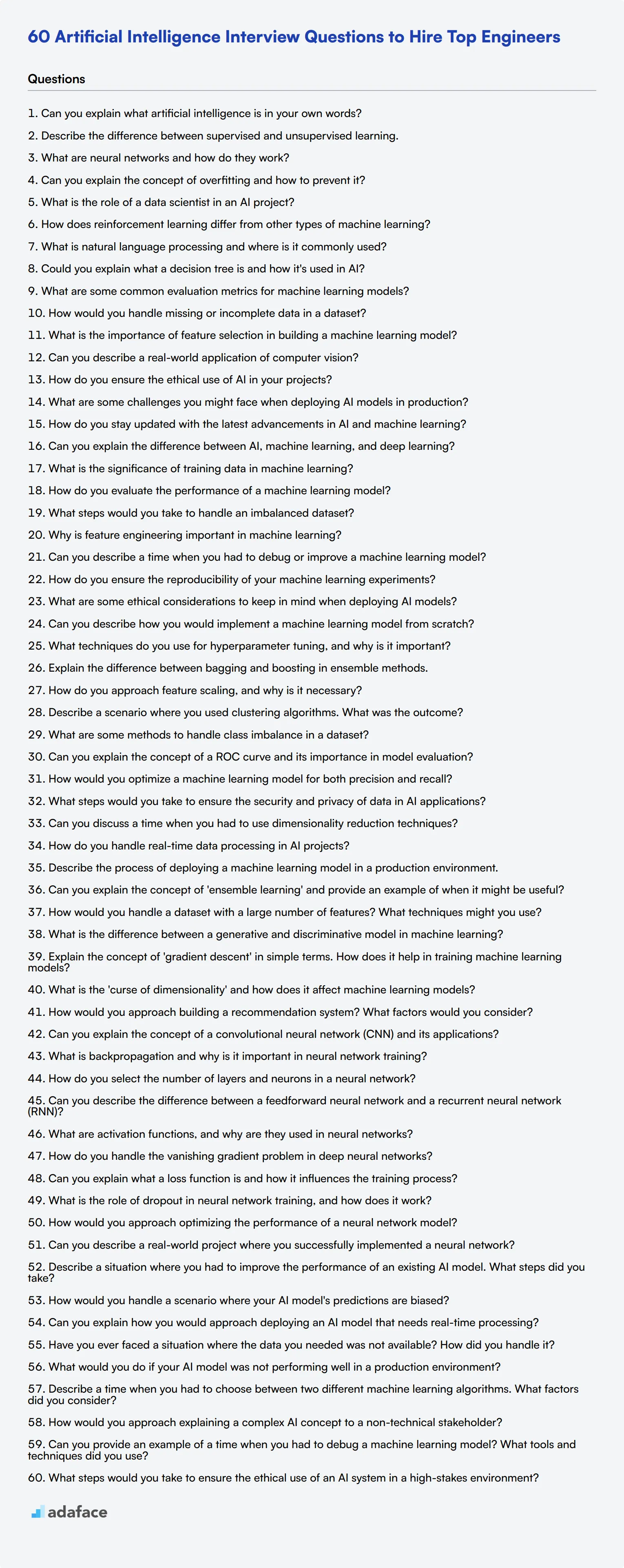Hiring top-tier Artificial Intelligence talent requires a deep understanding of the field and the ability to ask insightful questions during interviews. As AI continues to revolutionize industries, recruiters and hiring managers need a comprehensive set of interview questions to assess candidates effectively and make informed decisions.
This blog post provides a curated list of AI interview questions and answers, ranging from basic concepts to advanced topics and situational scenarios. We've organized the questions into different sections based on complexity and specific AI domains, including machine learning algorithms and neural networks.
By using these questions, you can thoroughly evaluate candidates' AI knowledge and problem-solving skills. Additionally, consider complementing your interview process with pre-employment AI assessments to get a more holistic view of candidates' capabilities.
Table of contents
15 basic Artificial Intelligence interview questions and answers to assess candidates
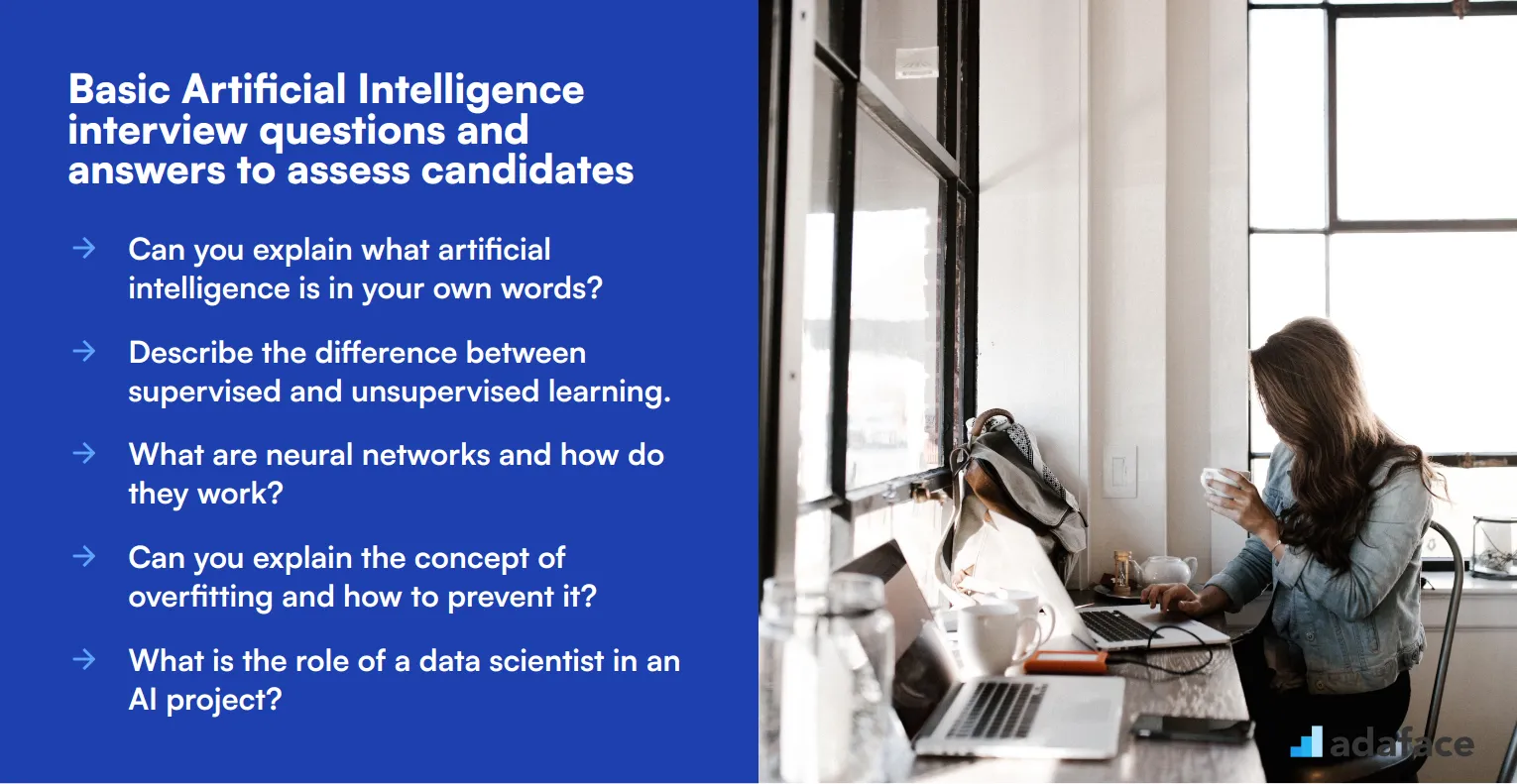
To assess whether your candidates have a solid foundation in Artificial Intelligence, consider using these 15 essential AI interview questions. These questions are designed to gauge their understanding and skills, helping you identify the right fit for roles such as machine learning engineer or data scientist.
- Can you explain what artificial intelligence is in your own words?
- Describe the difference between supervised and unsupervised learning.
- What are neural networks and how do they work?
- Can you explain the concept of overfitting and how to prevent it?
- What is the role of a data scientist in an AI project?
- How does reinforcement learning differ from other types of machine learning?
- What is natural language processing and where is it commonly used?
- Could you explain what a decision tree is and how it's used in AI?
- What are some common evaluation metrics for machine learning models?
- How would you handle missing or incomplete data in a dataset?
- What is the importance of feature selection in building a machine learning model?
- Can you describe a real-world application of computer vision?
- How do you ensure the ethical use of AI in your projects?
- What are some challenges you might face when deploying AI models in production?
- How do you stay updated with the latest advancements in AI and machine learning?
8 Artificial Intelligence interview questions and answers to evaluate junior engineers
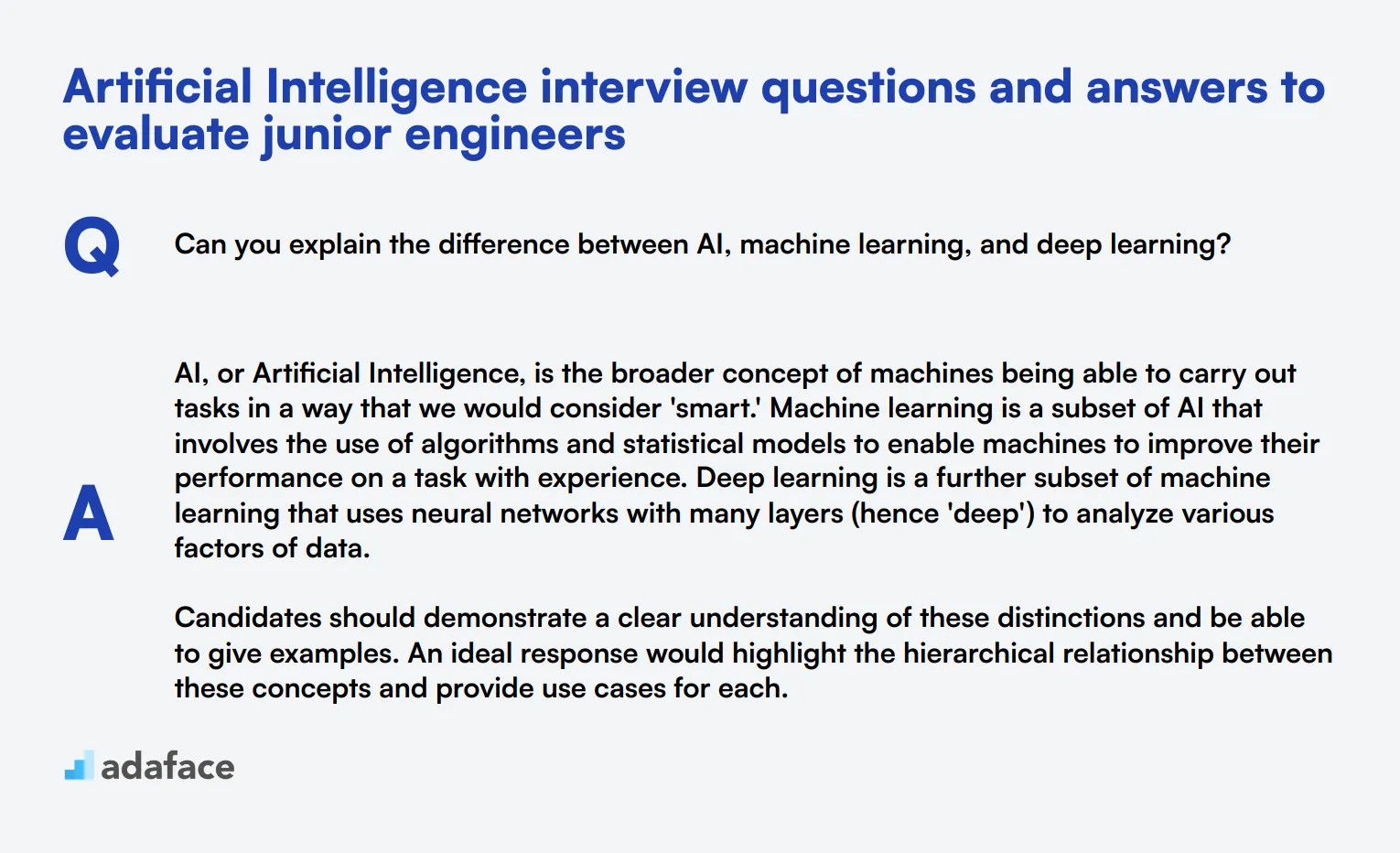
To gauge whether a junior engineer understands the fundamental concepts of artificial intelligence, use these carefully curated questions. These questions will help you identify candidates who possess the foundational knowledge needed to grow and thrive in your organization.
1. Can you explain the difference between AI, machine learning, and deep learning?
AI, or Artificial Intelligence, is the broader concept of machines being able to carry out tasks in a way that we would consider 'smart.' Machine learning is a subset of AI that involves the use of algorithms and statistical models to enable machines to improve their performance on a task with experience. Deep learning is a further subset of machine learning that uses neural networks with many layers (hence 'deep') to analyze various factors of data.
Candidates should demonstrate a clear understanding of these distinctions and be able to give examples. An ideal response would highlight the hierarchical relationship between these concepts and provide use cases for each.
2. What is the significance of training data in machine learning?
Training data is crucial in machine learning because it is used to teach the model how to make predictions or decisions. The quality and quantity of training data directly impact the model's accuracy and performance. Poor or insufficient training data can lead to inaccurate models.
Look for candidates who emphasize the importance of having a diverse and comprehensive dataset. They should mention data preprocessing steps like cleaning and normalization to ensure high-quality training data.
3. How do you evaluate the performance of a machine learning model?
The performance of a machine learning model is typically evaluated using metrics such as accuracy, precision, recall, F1 score, and AUC-ROC. The choice of metric depends on the specific problem and the goals of the model.
Candidates should explain the context in which each metric is useful. For example, precision and recall are crucial in imbalanced datasets, whereas accuracy might be more suitable for balanced datasets. An ideal candidate would also discuss the importance of cross-validation and overfitting prevention techniques.
Learn more about evaluation metrics
4. What steps would you take to handle an imbalanced dataset?
Handling an imbalanced dataset involves several strategies such as resampling (oversampling the minority class or undersampling the majority class), using different evaluation metrics, and employing algorithms that are robust to imbalances.
Candidates should mention techniques like Synthetic Minority Over-sampling Technique (SMOTE) and discuss the pros and cons of each method. They should also talk about the importance of maintaining the original distribution of the dataset as much as possible.
5. Why is feature engineering important in machine learning?
Feature engineering is crucial because it directly impacts the performance of a machine learning model. It involves creating new features or modifying existing ones to improve the model's accuracy. Good feature engineering can make a significant difference, sometimes even more than the choice of algorithm.
Look for candidates who can provide examples of feature engineering techniques like normalization, encoding categorical variables, and creating interaction terms. They should also emphasize the iterative nature of this process and its reliance on domain knowledge.
6. Can you describe a time when you had to debug or improve a machine learning model?
When debugging or improving a machine learning model, it's essential to systematically check every component, from data preprocessing to feature selection to the model itself. One might start by examining the data for errors or inconsistencies, then move on to tuning hyperparameters or trying different algorithms.
Candidates should provide a specific example from their experience, detailing the problem they faced, the steps they took to troubleshoot it, and the outcome. This question helps assess problem-solving skills and practical experience.
7. How do you ensure the reproducibility of your machine learning experiments?
Ensuring reproducibility involves several practices such as using version control for code, keeping track of data versions, documenting experiments thoroughly, and using random seeds for any stochastic processes.
Candidates should emphasize the importance of reproducibility in collaborative environments and how it helps in verifying results and debugging. They might also talk about tools like Jupyter Notebooks, MLflow, or DVC.
8. What are some ethical considerations to keep in mind when deploying AI models?
Ethical considerations include ensuring fairness, transparency, and accountability in AI models. It is crucial to avoid biases in the training data, provide explanations for model decisions, and ensure data privacy.
Look for candidates who understand the broader implications of their work and can discuss specific measures they would take to address these ethical concerns. An ideal response would include examples of potential biases and how to mitigate them.
12 intermediate Artificial Intelligence interview questions and answers to ask mid-tier engineers
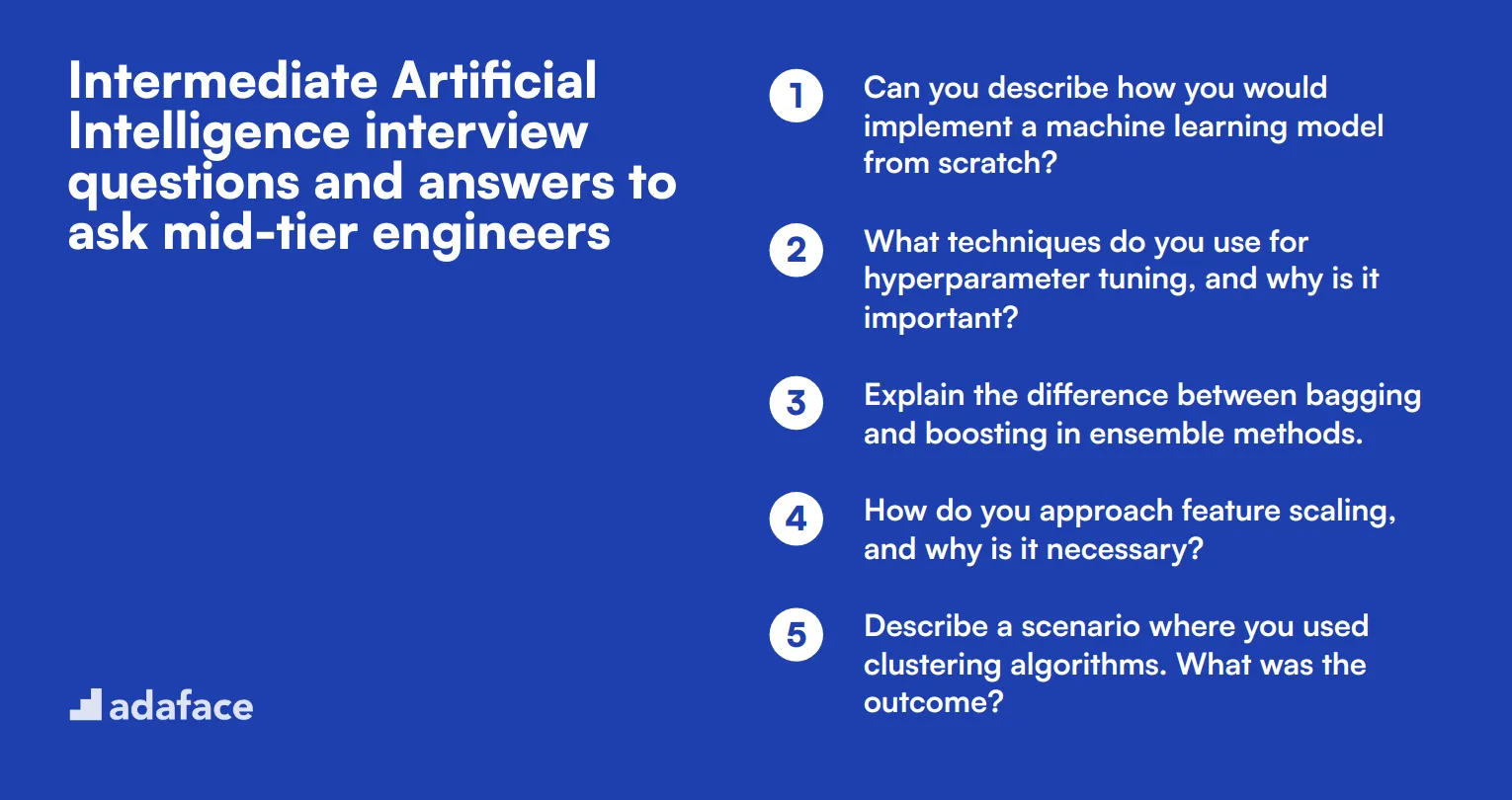
To gauge the proficiency of mid-tier AI engineers, consider using these intermediate artificial intelligence interview questions. These questions are designed to dig deeper into their practical knowledge and problem-solving abilities, helping you identify candidates who truly stand out. For more details on relevant job descriptions, visit our site.
- Can you describe how you would implement a machine learning model from scratch?
- What techniques do you use for hyperparameter tuning, and why is it important?
- Explain the difference between bagging and boosting in ensemble methods.
- How do you approach feature scaling, and why is it necessary?
- Describe a scenario where you used clustering algorithms. What was the outcome?
- What are some methods to handle class imbalance in a dataset?
- Can you explain the concept of a ROC curve and its importance in model evaluation?
- How would you optimize a machine learning model for both precision and recall?
- What steps would you take to ensure the security and privacy of data in AI applications?
- Can you discuss a time when you had to use dimensionality reduction techniques?
- How do you handle real-time data processing in AI projects?
- Describe the process of deploying a machine learning model in a production environment.
6 Artificial Intelligence interview questions and answers related to machine learning algorithms
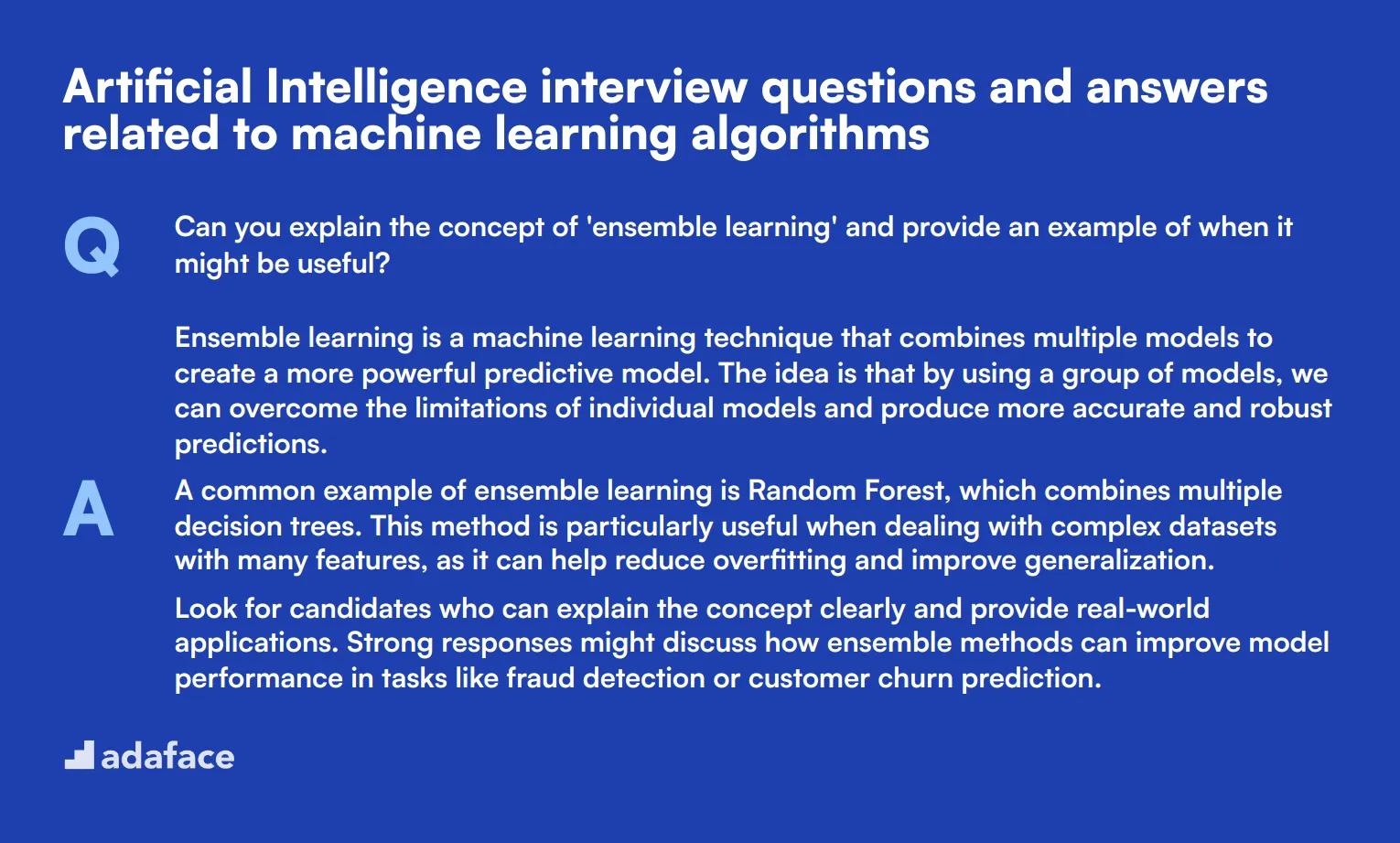
Ready to dive into the world of machine learning algorithms? These carefully crafted questions will help you assess a candidate's understanding of key concepts without getting too technical. Use them to spark insightful discussions and gauge how well applicants can explain complex ideas in simple terms. After all, a great AI professional should be able to communicate their knowledge effectively!
1. Can you explain the concept of 'ensemble learning' and provide an example of when it might be useful?
Ensemble learning is a machine learning technique that combines multiple models to create a more powerful predictive model. The idea is that by using a group of models, we can overcome the limitations of individual models and produce more accurate and robust predictions.
A common example of ensemble learning is Random Forest, which combines multiple decision trees. This method is particularly useful when dealing with complex datasets with many features, as it can help reduce overfitting and improve generalization.
Look for candidates who can explain the concept clearly and provide real-world applications. Strong responses might discuss how ensemble methods can improve model performance in tasks like fraud detection or customer churn prediction.
2. How would you handle a dataset with a large number of features? What techniques might you use?
When dealing with a dataset that has a large number of features, there are several techniques that can be employed:
- Feature Selection: Identify and select the most relevant features using methods like correlation analysis, mutual information, or feature importance from tree-based models.
- Dimensionality Reduction: Use techniques like Principal Component Analysis (PCA) or t-SNE to reduce the number of features while preserving important information.
- Regularization: Apply L1 (Lasso) or L2 (Ridge) regularization to automatically reduce the impact of less important features.
- Feature Engineering: Create new, more meaningful features by combining or transforming existing ones.
A strong candidate should be able to explain these techniques and discuss when each might be most appropriate. Look for answers that demonstrate an understanding of the trade-offs between different approaches and the ability to choose the right technique based on the specific problem and dataset characteristics.
3. What is the difference between a generative and discriminative model in machine learning?
Generative models and discriminative models are two different approaches to solving classification problems in machine learning:
- Generative Models: These models learn the joint probability distribution P(X,Y) of the input features X and the target variable Y. They try to understand how the data is generated and can create new samples. Examples include Naive Bayes and Hidden Markov Models.
- Discriminative Models: These models focus on learning the conditional probability distribution P(Y|X), directly mapping inputs to outputs. They are typically more concerned with decision boundaries between classes. Examples include Logistic Regression and Support Vector Machines.
An ideal response should highlight that generative models can often perform well with less training data and are more flexible, while discriminative models often achieve better accuracy for prediction tasks when sufficient data is available. Look for candidates who can provide examples and discuss scenarios where one approach might be preferred over the other.
4. Explain the concept of 'gradient descent' in simple terms. How does it help in training machine learning models?
Gradient descent is an optimization algorithm used to find the minimum of a function. In machine learning, it's commonly used to minimize the error or loss function of a model during training.
Think of it like trying to find the bottom of a valley while blindfolded. You take steps in the direction where the ground slopes downward most steeply. In machine learning, the 'valley' is the error landscape, and each step adjusts the model's parameters to reduce the error.
Look for candidates who can explain this concept without relying on technical jargon. They should be able to discuss how gradient descent iteratively updates model parameters, the concept of learning rate, and potential challenges like local minima. Strong responses might also mention variants like stochastic gradient descent or mini-batch gradient descent.
5. What is the 'curse of dimensionality' and how does it affect machine learning models?
The curse of dimensionality refers to various phenomena that arise when analyzing and organizing data in high-dimensional spaces. As the number of features or dimensions increases, the amount of data needed to generalize accurately grows exponentially.
In machine learning, this can lead to several problems:
- Increased computational complexity
- Overfitting due to sparse data
- Difficulty in visualizing and understanding the data
- Reduced effectiveness of distance-based methods
A strong candidate should be able to explain how this concept impacts model performance and suggest strategies to mitigate its effects, such as feature selection, dimensionality reduction, or using models that are less susceptible to high dimensionality (like decision trees). Look for answers that demonstrate an understanding of the practical implications in real-world machine learning projects.
6. How would you approach building a recommendation system? What factors would you consider?
Building a recommendation system involves several key considerations:
- Data Collection: Gathering user behavior data, item characteristics, and contextual information.
- Approach Selection: Choosing between content-based, collaborative filtering, or hybrid methods.
- Feature Engineering: Creating relevant features that capture user preferences and item attributes.
- Model Selection: Deciding on algorithms like matrix factorization, neural networks, or neighborhood methods.
- Evaluation Metrics: Determining appropriate metrics such as NDCG, precision@k, or user engagement.
Factors to consider include scalability, cold start problem (for new users or items), real-time vs. batch processing, and handling explicit vs. implicit feedback.
Look for candidates who can discuss these aspects in depth and provide examples of how they've tackled similar challenges. Strong responses might also touch on ethical considerations, such as filter bubbles or privacy concerns in recommendation systems.
10 Artificial Intelligence interview questions about neural networks
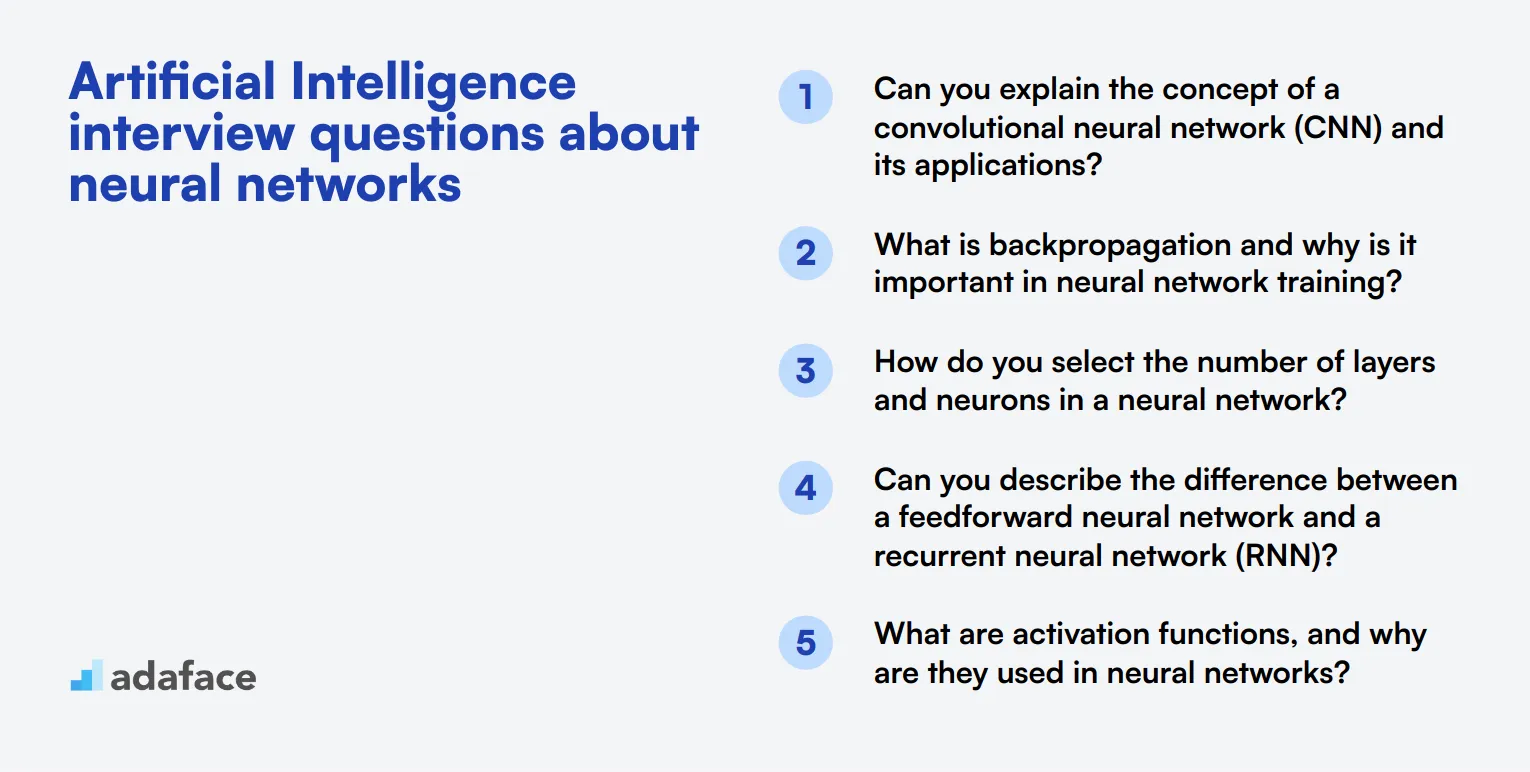
To determine whether your candidates have a solid understanding of neural networks, use these AI interview questions. These questions will help you gauge their technical knowledge and problem-solving skills, ensuring they are the right fit for your machine learning engineer or AI team roles.
- Can you explain the concept of a convolutional neural network (CNN) and its applications?
- What is backpropagation and why is it important in neural network training?
- How do you select the number of layers and neurons in a neural network?
- Can you describe the difference between a feedforward neural network and a recurrent neural network (RNN)?
- What are activation functions, and why are they used in neural networks?
- How do you handle the vanishing gradient problem in deep neural networks?
- Can you explain what a loss function is and how it influences the training process?
- What is the role of dropout in neural network training, and how does it work?
- How would you approach optimizing the performance of a neural network model?
- Can you describe a real-world project where you successfully implemented a neural network?
9 situational Artificial Intelligence interview questions for hiring top engineers
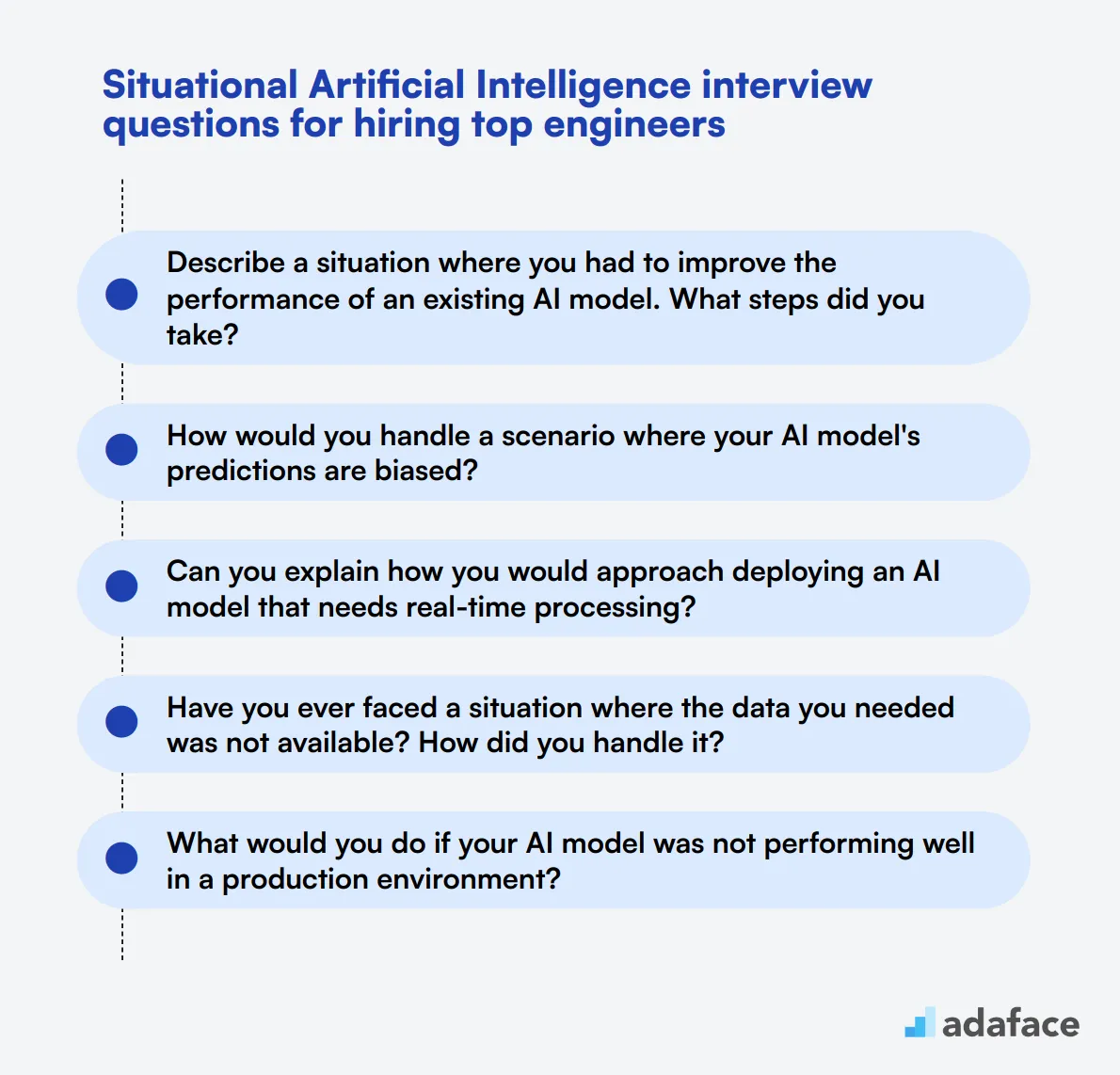
To identify and hire top AI engineers, you need to ask insightful situational questions that go beyond theoretical knowledge. This list will help you assess how candidates approach real-world challenges and their problem-solving skills. Use these questions during interviews to gauge practical expertise and readiness for complex AI projects. For more detailed information, you can also refer to the data scientist job description.
- Describe a situation where you had to improve the performance of an existing AI model. What steps did you take?
- How would you handle a scenario where your AI model's predictions are biased?
- Can you explain how you would approach deploying an AI model that needs real-time processing?
- Have you ever faced a situation where the data you needed was not available? How did you handle it?
- What would you do if your AI model was not performing well in a production environment?
- Describe a time when you had to choose between two different machine learning algorithms. What factors did you consider?
- How would you approach explaining a complex AI concept to a non-technical stakeholder?
- Can you provide an example of a time when you had to debug a machine learning model? What tools and techniques did you use?
- What steps would you take to ensure the ethical use of an AI system in a high-stakes environment?
Which Artificial Intelligence skills should you evaluate during the interview phase?
While it's impossible to fully gauge a candidate's capabilities in a single interview, focusing on key Artificial Intelligence skills can offer deep insights. Identifying these core skills is imperative for assessing how well a candidate is suited for the AI role.
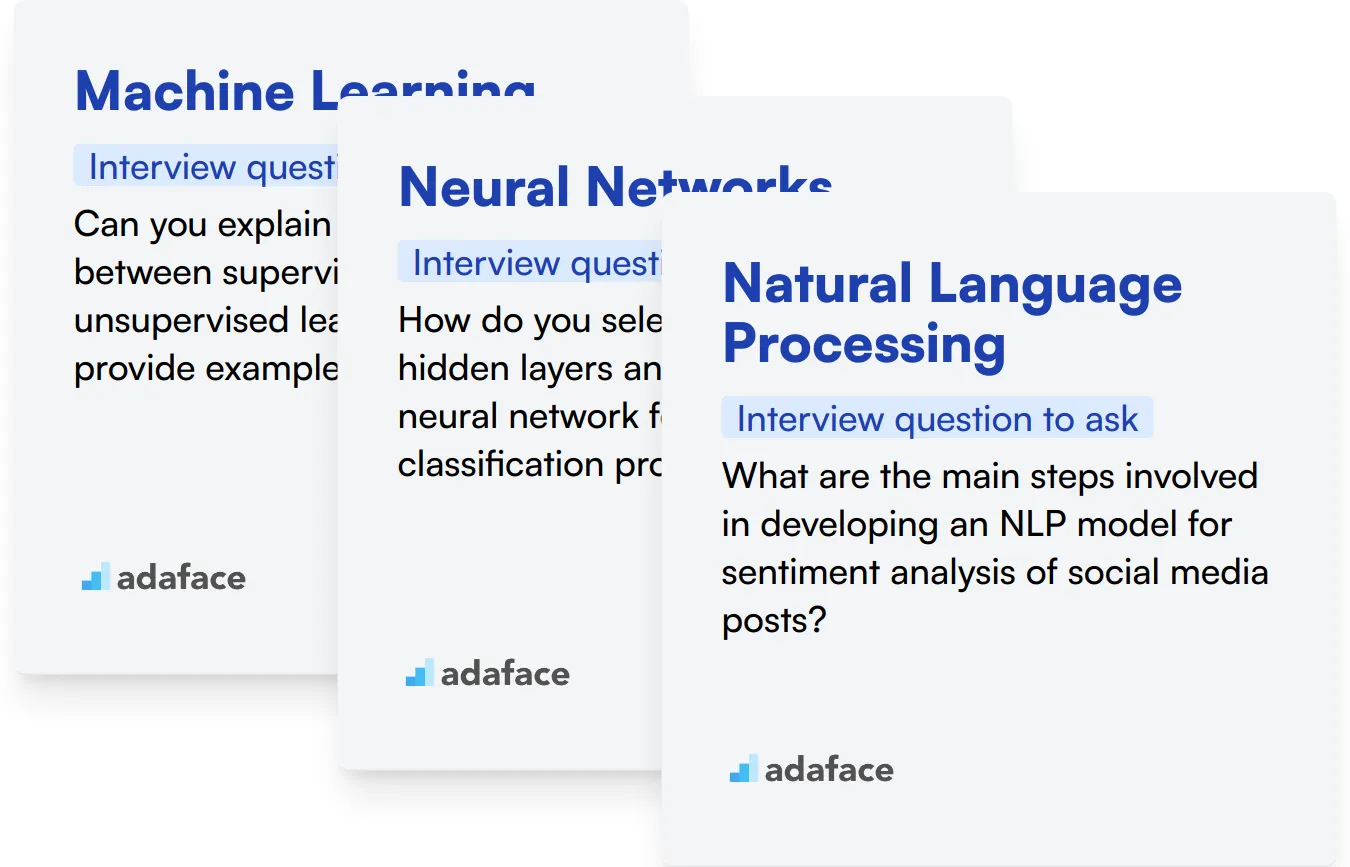
Machine Learning
Machine learning is the backbone of AI, enabling systems to learn and improve from experience without explicit programming. Mastery in this area is critical as it drives the functionality of AI applications.
For an initial evaluation, consider using a machine learning assessment test. Adaface offers a machine learning online test that filters candidates proficient in this indispensable AI domain.
To further examine a candidate's grasp on machine learning, pose targeted questions that reveal their depth of understanding and practical skills.
Can you explain the difference between supervised and unsupervised learning, and provide examples of each?
Look for clarity in understanding the core concepts and the ability to provide real-world applications. It’s telling if they can discuss the strengths and limitations of each learning type.
Neural Networks
Neural networks mimic the human brain and are essential in solving complex patterns and predictions in AI. Understanding this concept is fundamental for roles involving deep learning and AI modeling.
Before the interview, assess candidates' theoretical and practical knowledge of neural networks through Adaface's neural networks test.
In the interview, ask questions that allow candidates to demonstrate their operational knowledge of neural networks.
How do you select the number of hidden layers and neurons in a neural network for a text classification problem?
Evaluate their rationale behind the network architecture decision, which should include considerations of the problem’s complexity and data type.
Natural Language Processing
Natural Language Processing (NLP) is pivotal for AI systems that interact with human languages. Proficiency in NLP indicates a candidate's ability to bridge AI with human communication.
A structured way to gauge NLP expertise is through Adaface's Natural Language Processing test. This test helps in identifying candidates who are well-versed in NLP techniques.
To dig deeper into their practical NLP skills, present them with a relevant interview question.
What are the main steps involved in developing an NLP model for sentiment analysis of social media posts?
Candidates should be able to methodically detail each step from data collection to model deployment, highlighting any specific challenges associated with social media text.
Hiring the best Artificial Intelligence candidates with Adaface
If you're looking to hire someone with Artificial Intelligence skills, you need to ensure they possess these skills accurately.
The best way to do this is to use skill tests. Consider using our Artificial Intelligence Tests or Machine Learning Online Test.
Once you deploy these tests, you can shortlist the best applicants and invite them for interviews.
Next, head over to our signup page to start using our assessment tools immediately.
Machine Learning Assessment Test
Download Artificial Intelligence interview questions template in multiple formats
Artificial Intelligence Interview Questions FAQs
AI interview questions should cover foundational concepts, algorithms, machine learning, neural networks, and situational problem-solving scenarios.
To assess a junior AI engineer's skills, ask questions related to basic AI concepts, programming skills, and simple algorithm implementations.
For mid-tier AI engineers, intermediate-level questions about machine learning, neural networks, and practical problem-solving are appropriate.
Situational AI interview questions help evaluate a candidate's problem-solving abilities and how they apply AI concepts in real-world scenarios.
Good machine learning algorithm questions might include topics like classification, regression, clustering, and neural network basics.
An AI interview should be structured to assess theoretical knowledge, practical skills, problem-solving abilities, and situational responses.

40 min skill tests.
No trick questions.
Accurate shortlisting.
We make it easy for you to find the best candidates in your pipeline with a 40 min skills test.
Try for freeRelated posts
Free resources




